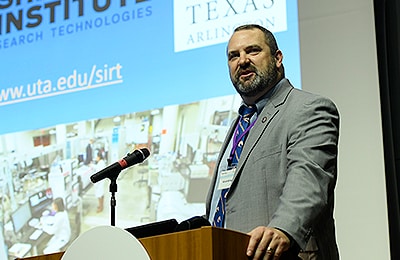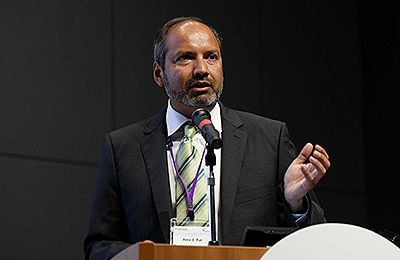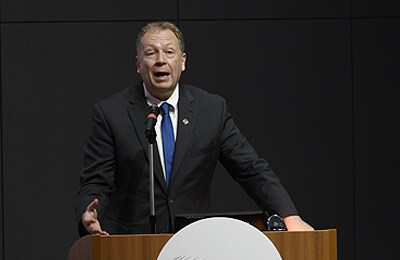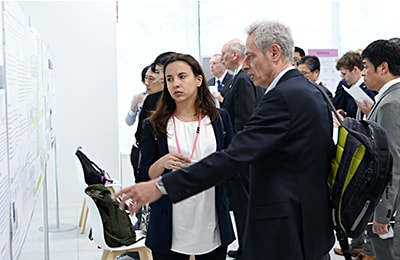Shimadzu Global Innovation Summit 2019
A highlight of Shimadzu’s global efforts to catalyze collaboration: Looking back at the Shimadzu Global Innovation Summit 2019

-
The Advanced Healthcare field, past and future
-
Showcasing successful collaborations and their results
-
A poster session brimming with innovation
-
Shimadzu’s focus on Advanced Healthcare
-
An open platform for collaboration - Shimadzu’s Healthcare R&D Center
-
Providing solutions to global issues through collaborative efforts
As part of its efforts to advance collaborations in the field of Advanced Healthcare*, Shimadzu Corporation held the “Shimadzu Global Innovation Summit 2019” from 9th-10th July. This year’s event, on the theme of “Pioneering Partnerships for Advanced Healthcare”, saw a diverse pool of 93 researchers from 21 countries travelling to Shimadzu’s headquarters in Kyoto. The event featured an engaging schedule, including a poster session and conference-style seminars, all of which facilitated lively exchanges amongst the participants.
The Global Innovation Summit has become a key part of Shimadzu’s vision as a company with a strong focus on the value of global cooperation. The Shimadzu Group has a total of 52 local branches in 25 countries and 11,954 employees worldwide. Shimadzu promotes collaboration between industry and academia through its Global Innovation Centers in the US, Singapore, China, Germany and Japan, and this collaboration was a driving concept in the planning of the Innovation Summit. As a company, Shimadzu also received international recognition when one of its employees was granted a Nobel Prize; Koichi Tanaka, currently the General Manager of Shimadzu’s Koichi Tanaka Mass Spectrometry Research Laboratory, was awarded science’s highest honor in 2002 for his contributions to new techniques for the analysis of biological macromolecules.
This year marked the second Global Innovation Summit, opened as before by the CEO of Shimadzu, Teruhisa Ueda: “We want to make this event a stage for global research development, a place where free discussion and the establishment of new connections can lead to true cooperation with the goal of the betterment of our society.” One key location to make this stated goal a reality is the newly opened “Healthcare R&D Center” (see below for more information), which was introduced to the participants through a tour of the collaborative research space “KYOLABS”. The open-plan concept of this facility made it the perfect location for the poster session, and the sharing of ideas the session facilitated.
*Advanced Healthcare describes the synergistic combination of Shimadzu’s core technologies in analytical science and medical diagnostic imaging for application in the field of healthcare. Shimadzu uses this term in a general sense to describe its solutions for all stages of healthcare including disease prevention, diagnosis, treatment, and prognosis as well as drug discovery.
Related Website* Shimadzu Advanced Healthcare
The Advanced Healthcare field, past and future
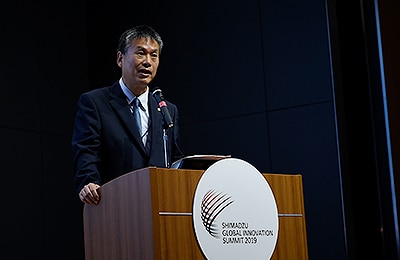
Following Dr. Ueda’s introductory remarks, Shuzo Maruyama, the General Manager of Shimadzu’s Analytical & Measuring Instruments Division, took to the stage. He introduced multiple examples of collaborations that have led to success, including groundbreaking research for the early detection of Alzheimer’s via blood plasma analysis, achieved through collaboration with Prof. Colin L. Masters from Melbourne University; an adrenal venous sampling (AVS) support system for primary aldosteronism developed in cooperation with Prof. Kei Takase from Tohoku University; and a cancer photoimmunotherapy method developed together with Hisataka Kobayashi from the National Cancer Institute (NCI). In showcasing this exciting research, Mr. Maruyama underscored his expectation for even more successful collaborations in the future.
Showcasing successful collaborations and their results
The first day continued with the introduction of researchers who met at the “Shimadzu Global Innovation Summit 2017”, and their successful collaboration over the past years. One such example was between Prof. Kevin A. Schug (University of Texas at Arlington), who specializes in environmental research, and Prof. Alex J. Rai (Colombia University), whose research is focused on pathology and cell biology.
Upon meeting at the 2017 Summit, they soon commenced a collaborative research project. As Prof. Schug explained, this research aims to “to develop methodology for intact protein quantitation using liquid chromatography – triple quadrupole mass spectrometry.” In their presentation, the two professors introduced their research and talked about their collaboration in detail.
Prof. Schug also mentioned the Shimadzu technology that aided in their research: “Shimadzu instrumentation is an essential part of our analytical chemistry research. Shimadzu consistently offers new instrumentation, which pushes the boundaries of what can be measured. As one example, the variable collision gas pressure in the LCMS-8050 and LCMS-8060 instruments is essential to being able to fragment large biomolecules in a multiple reaction monitoring-type experiment.”
In addition, Prof. Schug underlined what they wish to achieve with their research: “We can contribute to society and the well-being of humankind by helping clinicians better assess cancer diseases, as well as to potentially help the pharmaceutical industry develop new treatments.”
In addition, numerous other researchers introduced exciting developments in their research that proposed new synergies between analytical science and medical imaging technology. For instance, Prof. Philipp Scherer (University of Texas Southwestern Medical Center) discussed clinical treatment applications of mass spectrometry.
A poster session brimming with innovation
Following the initial round of speeches, the event moved on to the poster session, in which 57 guests and 15 Shimadzu employees showcased their research. The open layout of the session allowed for lively discussion between researchers from diverse fields. After voting by all participants, a panel of judges determined 6 award winners, who presented their research on the main stage the following day.
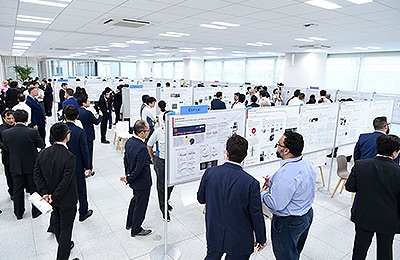
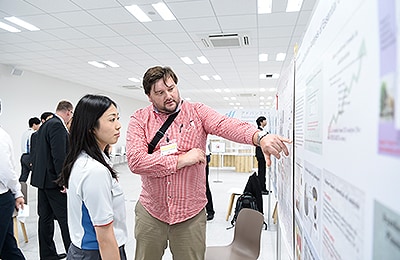
One award winner was Dr. Silvia Giordano (Mario Negri Institute Milan), who in recent years has started a collaborative project with Shimadzu at its Innovation Center in Germany, with the goal of rapid and objective tumor identification. In her research, she uses Shimadzu’s DPiMS-2020 (Direct Probe Ionization Mass Spectrometer), which was developed to assist fast analysis of pathology specimens. It was created together with Prof. Sen Takeda of the Faculty of Medicine at the University of Yamanashi as part of a Japan Science and Technology Agency (JST) program for the development of advanced measurement and analysis systems. The implementation of this technology into the clinical field is expected to reduce the surgical burden of cancer patients. Dr. Giordano has coupled this technology with Artificial Intelligence to obtain accurate and reproducible results.
Describing her experience at this year’s Global Innovation Summit, Dr. Giordano emphasized the opportunity that academic exchange at the event brought her: “The Shimadzu Global Innovation Summit 2019 has been a great opportunity to meet scientists from all over the world. As a young researcher, it has been very stimulating and encouraging to see so much interest in my research. My expectation now is to be able to put into practice all the suggestions received and to start new collaborations that can help to develop more efficiently my research project. Innovation is possible thanks to the debate with people who appear to work in a field that is far from yours and these opportunities are fundamental to inspire future steps.”
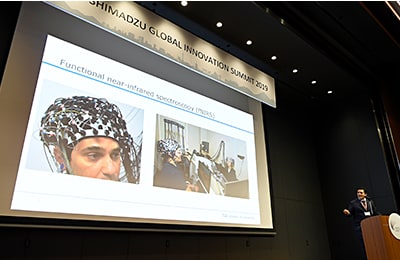
Dr. Adam Noah during his presentation
Shimadzu’s focus on Advanced Healthcare
The demographic changes happening primarily in developed countries have led to major considerations regarding low birth rates and longer life-spans. There are related unmet needs in the healthcare field, for instance with regards to cancer, dementia or immune disease.
As a pioneer in x-ray technology that can also look back on a long history as a leader in mass spectrometry, Shimadzu wants to utilize this unique position when working together with researchers around the world. Extremely early diagnostics, prevention, treatment - this is the cycle of healthcare, and Shimadzu is aiming to contribute to all of these stages, promoting healthy lives for everyone.
An open platform for collaboration - Shimadzu’s Healthcare R&D Center
One of the stages for this year’s event, the Healthcare R&D Center, is designed to be an open platform for collaboration between researchers and Shimadzu employees in the healthcare field. Its concept is based on encouraging a free exchange of ideas to promote open innovation and discover new applications for the company’s technology.
The center features two open innovation laboratories designed to connect and promote communication between researchers from different fields. The entire facility’s interior is based on a minimalistic, open-plan design to facilitate these interactions.
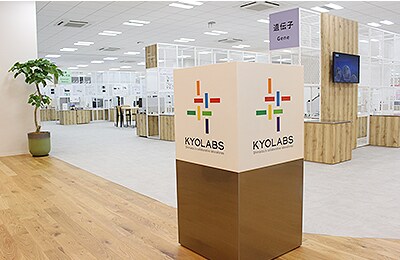
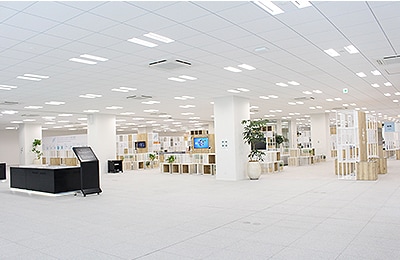
In August of 2019, Shimadzu and Japan’s National Agriculture and Food Research Organization (NARO) announced their collaboration, which has led to the establishment of a new research laboratory in the Healthcare R&D Center centering on the “new functionality of food”.
Providing solutions to global issues through collaborative efforts
The fact that we at Shimadzu can look back upon a 140-year history is not only thanks to our customers, but also due to the incredible partnerships we have forged over the years. We believe that such collaboration is needed to solve today’s problems, and we will continue to work actively in order to establish connections amongst industry, academia and government.
Throughout our history, we have tackled challenges through the development of original technology, and our efforts have come to fruition through staying faithful to our company motto - Contributing to Society through Science and Technology. Shimadzu, together with its partners, continues to provide solutions in the various areas it operates in, primarily in improving our health and well-being, providing a safe & secure society, and advancing industry.



